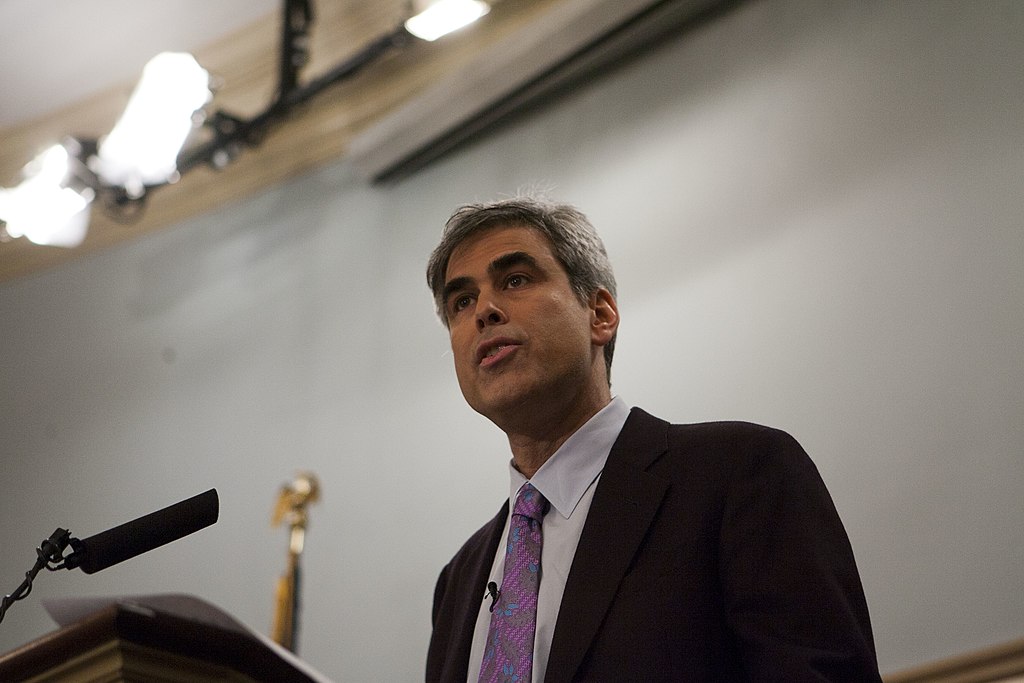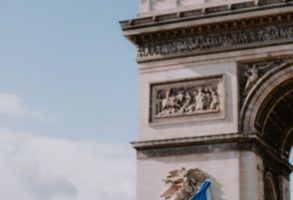
Published May 24, 2020
Over the past decade, no one has added more to my understanding of how we think about, discuss, and debate politics and religion than Jonathan Haidt.
I first connected with Haidt in 2012, after I wrote a blog post for Commentary based on an interview in which Haidt discussed his book The Righteous Mind: Why Good People Are Divided by Politics and Religion. “It’s extremely easy to spot the weak arguments, hypocrisy, and double standards of those with whom I disagree,” I wrote. “It’s much harder to see them in myself.” I then posed a series of questions: How open are we to persuasion, to new evidence, and to holding up our views to refinement and revision? How do we react when our arguments seem to be falling apart? And what steps can we take to ensure that we don’t insulate ourselves to the point that we are indifferent to facts that challenge our worldview?
Those questions were right in the wheelhouse of Haidt, the Thomas Cooley Professor of Ethical Leadership at New York University’s Stern School of Business. He wrote me an encouraging note after my article was published; two years later, we met in person for the first time.
Haidt’s writing and interviews, and our conversations, have clarified for me why we are so tempted to surround ourselves with only like-minded people and caricature those with whom we disagree. He has helped me understand why intellectual honesty is so elusive, why our divisions run so deep, and what steps we need to take to overcome the antipathy that characterizes so much of modern politics. He is also a model of what it means to be a public intellectual.
Over the years, our acquaintance has grown into a friendship, and I trust Haidt to make sense of the times in which we live. So in the midst of this deeply unsettled moment in American life, when we’re dealing with both polarization and a pandemic, I reached out to him.
Ibegan the interview by asking Haidt to reflect on what COVID-19 is revealing about American society, whether it would draw us closer together or push us farther apart, and how we might leverage this moment into greater social solidarity and cohesion. The best way to approach this question, he replied, is to look at the trajectory of American democracy over the past decade and a half or so.
Around 2008, Haidt became increasingly concerned by how politically polarized America was becoming, and polarization has only worsened over the past dozen years. “I’ve gotten more and more alarmed every year since then,” he told me, “and there are several trends that are very disturbing,” including the rise of “affective polarization,” or the mutual dislike and hate each political side feels for the other. “When there’s so much hatred, a democracy can’t work right,” he said. “You can’t get compromise. You get exactly the situation that the Founders feared, that [James] Madison wrote about in ‘Federalist 10,’ which is faction, which is people care more about defeating the other side than they do about the common good.”
For some time now, Haidt has been saying that if current trends continue, the United States may somehow come apart—but he always adds that trends never continue forever. Things change, sometimes for the better, sometimes for the worse; you can’t just extrapolate from the present. “When the COVID-19 crisis hit, at first I was very optimistic that no matter how bad things get, there’s a real chance this could throw us off of the downward trajectory we were on,” he said. “There’s a real chance that this could be the reset button. So that’s the framework that I bring to all of my thinking about the implications of this crisis for the country, that we were headed in a very bad direction and a lot is going to change. And so I am more hopeful now than I was before—but that isn’t saying much.”
Social media essentially gives a megaphone to the extremes, so it’s very hard to know what most people really think. “And when you look at the people who are loudest on Twitter and elsewhere, it’s quite clear that this pandemic is turning into just another culture-war issue, where people on the left see what they want to see and people on the right see what they want to see.”
But Haidt pointed out that several surveys, including one in April by More in Common, show that the pandemic is having the sort of unifying effect that major crises tend to have. Feelings toward Donald Trump are almost perfectly polarized, as one would expect. But on other important questions, there’s not that much polarization. For example, 90 percent of Americans believe that “we’re all in it together,” compared to just 63 percent in the fall of 2018. The share of Americans who describe the country as “unified” has grown from 4 percent in 2018 to 32 percent today, while the percentage of Americans who regard the country as “very divided” has dropped from 62 percent to just 22 percent. Other polls show that the divide between Republicans and Democrats on social-distancing measures isn’t all that large.
“When we look at the stories of moral beauty versus moral depravity, it certainly seems like there are far more stories of moral beauty out there than moral depravity,” Haidt said. “So what I think is happening is that the most politically active Americans are just incorporating this into their preexisting culture war, but most Americans seem to be having a surge of common sentiment, of prosocial feeling. We are all going through similar experiences at the same time, which has hardly ever happened before. So I’m still hopeful.”
Hopeful, but not naive. After all, historically pandemics have tended to split societies apart rather than bring them together, since they combine isolation with fear of others. And then you add Trump to the mix.
I asked Haidt how a country can unify in the face of a pandemic with a president like Trump, who is so intentionally divisive. He answered, as he often answers questions of this sort, by first making an observation about human nature.
People are very good at pursuing their self-interest, Haidt said, but they’re also able to forget their narrow self-interest and merge into larger groups. “Yet they are very wary about being exploited,” he added, “so we’re always looking for signs that the leader is sincere, is not a self-aggrandizer, is not exploiting us.” Leaders who create a sense that we’re all in this together and show moral leadership can help us overcome our differences and unite us.
Not so the 45th president. “The psychologists I spoke to before Trump was elected overwhelmingly said that the diagnosis they would make based on what they saw is narcissistic personality disorder,” Haidt said. “And I think we’ve seen that continuously since his election, that he tends to make everything about him. And so that is pretty much the opposite of ethical leadership, where it needs to be about the team and our shared interest. I don’t see much of a chance of us really coming together and overcoming our differences before the election. Or, basically, as long as Trump is in office.”
So what is Haidt hoping for? The political equivalent of Newton’s third law: For every action, there is an equal and opposite reaction. Haidt put it this way: “Since we already see signs that most Americans are exhausted by this culture war, [my hope is] that this year or into next year will be kind of a pit of despair or a pit of darkness—and then we’ll emerge from it.”
He continued, “I need to read up on how the religious wars ended in Europe, but my second- or thirdhand understanding is that it wasn’t that Europeans reached some profoundly enlightened view; they just got exhausted, and they realized, you know, we’ve got to stop this. And so that is actually my main source of hope, that things are so bad now and the fact that we can’t even confront a pandemic because of our polarization. We can’t share facts, we can’t share strategies, we can’t coordinate behavior because of our polarization. I think this will become increasingly clear.”
Jonathan David Haidt was born 56 years ago in New York City, and was raised in Scarsdale in a liberal Jewish family. (His parents were the first generation of their families to be born in America; his grandparents were born in Russia and Poland, moved to the United States as teenagers, and worked in the garment industry.) He grew up “very assimilated,” he said, and with a love for science. He began to identify as an atheist by the time he was 15.
He studied philosophy at Yale, where, he told me, “the zeitgeist was very much politically progressive, anti-Republican, anti-Reagan. And so I was very moralistic, very self-righteous. I think I was angry throughout the ’80s, or at least in a sort of a shallow, political way. And so I think I wasn’t a very interesting person intellectually or morally throughout the ’80s and throughout my young-adult years.”
In 1992, Haidt received his Ph.D. in psychology at the University of Pennsylvania, where he encountered several professors who had interesting things to say about morality that, he said, “set me up to think about a much broader moral domain.” But it was the years immediately following Haidt’s time at the University of Pennsylvania that were transformational. He spent two years at the University of Chicago working with Richard Shweder, an anthropologist, who was his postdoctoral research adviser. Shweder has a motto: If someone asserts it, try denying it and see if that makes sense. If someone denies it, try asserting it and see if that makes sense. “It’s a great way to overcome confirmation bias and to try on new ideas,” Haidt told me. “Richard Shweder in particular just blew my mind wide open.” The experience “really changed me and prepared me to step out of my prior politics, my prior moralism, my prior self-righteousness.”
While he was at Chicago, Haidt received a fellowship to study morality in India. In September 1993 he traveled to Bhubaneswar, in the Indian state of Odisha, where, among other things, he learned the power of rituals and of a commitment to religious purity as a way to knit communities together. While in India, Haidt “really tried to understand a culture very different from my own, and in the process, for the first time, I was able to look at evangelical and conservative Christianity not as a force hostile to me as an atheist, a cosmopolitan, and a Jew, but as a moral community striving for certain virtues—and I could understand those virtues and I could respect those virtues. It was that combination that really drained me of my anger and hostility and, I think, helped me to just listen to people and try to map out what [they are] aiming for. What are the virtues they’re trying to instill? What is the vision of the good that they are pursuing? Without that period, I don’t think I ever could have written The Righteous Mind or been of much use in studying a culture war.”
Haidt considered himself a partisan liberal through the mid-2000s, but a key moment occurred in a used bookstore in New York City just a month after John Kerry had been defeated by George W. Bush.
In preparation for teaching a graduate seminar in the spring of 2005 on political psychology, Haidt read an introductory essay by the historian Jerry Muller in a book Muller edited, Conservatism: An Anthology of Social and Political Thought From David Hume to the Present. All of a sudden, a whole new world opened up. Haidt discovered that conservatives had some important insights to offer on human nature, the value of institutions, and the importance of moral capital. He felt conservatism offered an important counterbalance to the excesses of progressivism. He also came to appreciate the pedigree of conservatism, from the writings of people like Edmund Burke in the 18th century to Thomas Sowell in the 20th. (Haidt told me he considers himself to be a centrist, engaging with views from multiple sides in order to understand issues. But he’s a centrist who only ever votes for Democrats, because he thinks the Republican Party has been in a state of moral and philosophical decline for many years.)
Haidt laments the state of contemporary American politics, believing that on both the right and the left we’re seeing populism that responds to real problems but in illiberal ways. “On the right,” he said, “the populism there is really explicitly xenophobic and often explicitly racist … I think we see strands of populism on the right that are authoritarian, that I would say are incompatible with a tolerant, pluralistic, open democracy.”
Looking in the other direction, Haidt says, “we’ve messed up the word liberal and we’ve used it to just mean ‘left.’ I’ve always thought of myself as a liberal, in the John Stuart Mill sense. I believe in a society that is structured to give individuals the maximum freedom to construct lives that they want to live. We use a minimum of constraint, we value openness, creativity, individual rights. We try hard to maximize religious liberty, economic liberty, liberty of conscience, freedom of speech. That’s my ideal of a society, and that’s why I call myself a liberal.”
But on the left, Haidt said, “there’s been a movement that has made something else sacred, that has not focused on liberty, but that is focused instead on oppression and victimhood and victimization. And once you get into a framework of seeing your fellow citizens as good versus evil based on their group, it’s kind of a mirror image of the authoritarian populism on the right. Any movement that is assigning moral value to people just by looking at them is a movement I want no part of.”
Haidt went on: “I think this is a very important point for us to all keep in mind, that left and right in this country are not necessarily liberal and conservative anymore. On the left, it’s really clear that there are elements that many of us consider to be very illiberal; and on the right, it’s hard to see how Trump and many of his supporters are conservatives who have any link whatsoever to Edmund Burke. It’s very hard for me to see that. You know, I would love to live in a country with true liberals and true conservatives that engage with each other. That, I think, is a very productive disagreement. But it’s the illiberalism on each side that is making our politics so ugly, I believe.”
Shifting from politics to religion, I told Haidt that, given his general temperament—he’s a man who prizes epistemological humility—I found it surprising that he considered himself an atheist, albeit a low-wattage one, rather than an agnostic. I asked him why he identified as an atheist.
“I think of myself as an atheist, just meaning I don’t believe that there is a God, but it’s not a part of my identity that I think that,” Haidt said. “Here’s what I would say to go along with that: I’m an atheist who believes that religion is part of human nature, is generally a good part of human nature, and an essential part of who we are and how we became a civilized species.” He added that he was very influenced by the sociological literature on the effects of religion, at least in the United States, and especially a book by Robert Putnam and David Campbell, American Grace: How Religion Divides and Unites Us.
“It’s very clear that if you’re part of a religious community [in America], you generate more social capital, you’re more prosocial,” Haidt explained. “I guess I’ve fallen into a role of an atheist who is the opposite of a New Atheist. In fact, I got into some arguments with the New Atheists because I was defending religion against some of their charges.”
Haidt has been invited to speak to various Christian organizations and universities and has “found a point of commonality.” “I’m always up front that I’m an atheist,” he explained, “but I say to them: I agree with you that there is a God-shaped hole in everyone’s heart.” That line reflects the sentiments expressed by Saint Augustine, and Blaise Pascal in his Pensées. “You and I disagree on how it got there. I’m a naturalist; I believe that we evolved to be religious. A part of being human is believing in gods and worshipping and having a sense of the sacred. And I think we have a need, we have a hole in our heart, I believe it got there by evolution, it got there naturally, and it is effectively filled by God for most people. It can be filled by other things. But I think it needs to be filled by something—and if you leave it empty [people] don’t just feel an emptiness. A society that has no sense of the sacred is one in which you’ll have a lot of anomie, normlessness, loneliness, hopelessness.”
In the late 1990s, Martin Seligman, commonly considered the founder of positive psychology, argued that psychology focused an inordinate amount of attention on the dark side of human nature and the human mind. He believed that it needed to turn more of its attention to what makes for an emotionally healthy and satisfying life, to what leads to human flourishing, to what makes life worth living. So I asked Haidt, an admirer of Seligman’s work, about the psychology of happiness, which was the subject of Haidt’s 2006 book, The Happiness Hypothesis: Finding Modern Truth in Ancient Wisdom. Specifically, I inquired about the essential role of relationships in the pursuit of happiness.
Haidt told me the evidence shows us that “when we get what we want, we quickly adapt to that. The satisfaction is very short lived, surprisingly short lived, and we actually get more happiness from making progress towards our goals than we do from achieving them.” He went on to argue that “modernity has given us extraordinary wealth, private rooms, the ability to be alone forever if we want. And what we find, the more we make progress, is a rising spiritual hunger. We’ve seen rising rates of depression gradually since the Second World War. There’s something that’s not quite satisfying about modernity and modern life. I think it all begins to make sense when you understand that we evolve as ultra-social creatures with needs to be part of a tight community. We are relational creatures; we have to have good relations between [ourselves] and others. No man is an island. We can’t really be happy alone. We need good relationships to be happy.”
Haidt said we’re also geared toward productivity—that we get great pleasure from making something happen in the world. “You see this even from babies,” he said. “A baby who discovers that by moving her head she can make a mobile move, it’s thrilling.” So we’ve got to get the right relations between ourselves and others, between ourselves and our work.
“We have to have some sense that we’re making progress, we’re doing something, we’re contributing something, we’re making something.” This matches, Haidt told me, what Freud reportedly said when he was asked about what contributes to good mental health: “Lieben und arbeiten”—love and work.
But there’s one other area Haidt mentioned in the context of happiness: purpose and meaning. “Those who find a way to be part of something larger than themselves, that are part of a noble community that is pursuing some positive and virtuous end—this brings us to the highest levels of human satisfaction, the sense that our lives are meaningful, are worth living. I think religious people, members of an active religious community, have a much easier time of that … And for atheists or secular people, it’s harder. This helps explain one of the common findings in positive psychology, that in general people who are part of a religious community are happier than people who are not.”
Haidt continued: “Of the major ethical theories, I think virtue ethics actually matches human nature the best and I think leads to the happiest life.”
As he was writing The Righteous Mind and discovering how edifying it was to read conservative intellectuals, Haidt said, “I felt like my mind was opening because I was exposed to other viewpoints that I had rejected for my whole life, while there was a rising intensity of the American culture war and it was really affecting my field of social psychology. I began to notice that any discussion about gender or LGBT issues or race, there was within a community of academics, a community of professors, who throughout my career had been able to talk about things—suddenly it was like there was a new force field coming in and it felt like you can’t explore that. You can’t say that. You can’t raise an alternate interpretation of this data set. There’s only one way to interpret this correlation.”
It was, in other words, an approach completely contrary to what his mentor at the University of Chicago had taught him. “This was personally upsetting to me,” he said. “I know we can’t put ideas and hypotheses off-limits. We have to be able to talk about the facts and the data and raise alternate hypotheses.”
So when Haidt, who was then teaching at the University of Virginia, was invited to give a lecture at the annual meeting of social psychologists in 2011, he titled it “The Bright Future of Post-Partisan Social Psychology.” Haidt envisioned a future in which universities would welcome a wider variety of ideas.
“I focused entirely on the quality of our science,” he said. “If we want psychology to be great, we have to work to include alternate ideas because they’re good for us. Because they break us out of our confirmation bias, they break up our orthodoxy and groupthink, and I said we need conservatives in particular in social psychology and I showed that we had only one that I was able to find.”
Out of that talk eventually emerged Heterodox Academy, which was founded in 2015 by Haidt, Chris Martin, and Nicholas Rosenkranz. It has become a significant organization, consisting of nearly 4,000 professors, administrators, and students, who are committed to promoting open inquiry, viewpoint diversity, and constructive disagreement in higher education. That commitment qualifies as controversial in today’s academy.
Haidt described to me the much more radical, confrontational culture on campus that has arisen in the last half decade, a subject he explored in The Altantic in “The Coddling of the American Mind,” an essay he wrote together with Greg Lukianoff. “The problem got much more serious because now the pressure’s on professors and students, the pressures to stay within,” Haidt told me. “They have a word in Swedish, åsiktskorridor, the ‘opinion corridor,’ they call it: ‘Here is where your opinions are allowed to be. You cannot step outside.’” Heterodox Academy is part of a movement to allow people to step outside the narrow opinion corridor, to challenge prejudices and preconceptions, and to return the academy to one of its core purposes.
I asked Haidt to explain to me precisely why it’s important that our prejudices and biases be challenged. “If you actually want to find the truth—if you’re a scientist or if you’re working at, say, the Defense Intelligence Agency, where your job is really to find the truth—you have to overcome each person’s preferred way of thinking, which is, find evidence for why I am right,” he replied. “You have to overcome that, and the only known way to overcome confirmation bias is with other people. There’s been research trying to train people to question their assumptions. Nobody’s found a way. It’s very hard to train people to do that. The only way to do it is to have someone who doesn’t share your confirmation bias engage with you. That’s why the Catholic Church created the devil’s advocate. They literally said, ‘Your job is to find reasons why we’re wrong.’”
I mentioned to Haidt that in my experience it makes a huge difference if you can establish a respectful and even warm relationship with people with whom you disagree, which allows both individuals to critique the other without feeling that either of you is under attack. When we feel we’re under attack, the armor goes up; the willingness to listen to the perspective of others goes down. If you don’t have a personal relationship with someone, I said, and you try to engage in rigorous debate, particularly in this hyper-polarized political moment, it’s often like shooting BBs against a brick wall. The arguments just bounce off.
Haidt agreed. “The relationship matters more than the message. That’s why a university, especially one that includes a diversity of viewpoints, can be so powerful—because you cultivate these relationships within a community that says our job is not to win, our job is to learn. That’s why the internet and especially Twitter are the worst places for this, because you don’t have relationships and people are trying to show how smart they are. They’re trying to show how devoted they are to their team. So the kind of political engagement, the kind of public square that we get from social media, is generally terrible. And again, that’s why I love universities so much and that’s what it was for me. The times I remember most are when my beliefs were shredded and I was shown new ways to think or given new ways to think.
“Does anyone really think we are going to win people over by insulting them and spouting hatred toward them?” he added. “Or are we going to win them over by listening, one on one, as individuals, human to human, American to American?”
At the conclusion of our interview, I asked Haidt what he hopes to contribute to people’s understanding, what he hopes to convey intellectually and morally to others.
“To help people to step out of their moral matrices and turn down their moral condemnation of their fellow citizens,” he told me. “The lesson from so many ancient traditions, and from social psychology, is that we need to be slower to judge and quicker to forgive. You can’t be hating and learning at the same time.”
For my part, when I think about what Haidt is trying to achieve, my mind goes back to one of the finest speeches in American political history. It was delivered extemporaneously by Robert Kennedy on the evening of April 4, 1968, after Martin Luther King Jr. was assassinated. Speaking to a shocked and grieving crowd in Indianapolis, Kennedy urged his listeners not to be filled with hatred or distrust.
“What we need in the United States is not division,” Kennedy said. “What we need in the United States is not hatred; what we need in the United States is not violence or lawlessness; but love and wisdom, and compassion toward one another, and a feeling of justice toward those who still suffer within our country.”
And then Kennedy said this: “Let us dedicate ourselves to what the Greeks wrote so many years ago: to tame the savageness of man and make gentle the life of this world.”
In his own field, in his own way, Jonathan Haidt is trying to heal our divisions and temper some of the hate, to increase our wisdom and understanding, and to urge us to show a bit more compassion toward one another. Like the ancient Greeks, who first gave us the academy, he is trying to make this world a little less savage, a little more gentle.
Peter Wehner a contributing writer at The Atlantic, a senior fellow at the Ethics and Public Policy Center, and Egan visiting professor at Duke University. He writes widely on political, cultural, religious, and national-security issues, and he is the author of The Death of Politics: How to Heal Our Frayed Republic After Trump.
Photo credit: The Miller Center. This file is licensed under the Creative Commons Attribution 2.0 Generic license.








